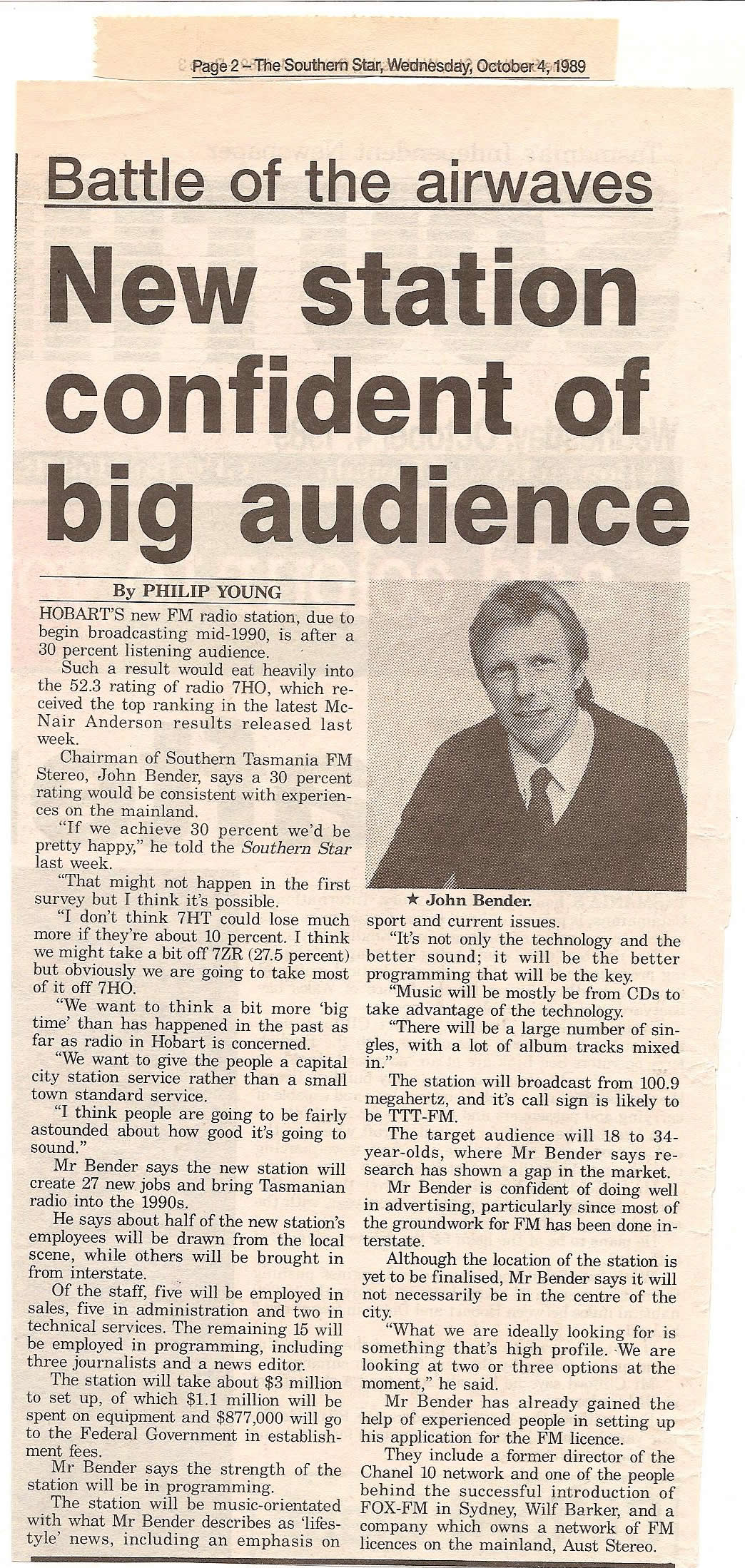7HO FM Hobart – From Worst to First
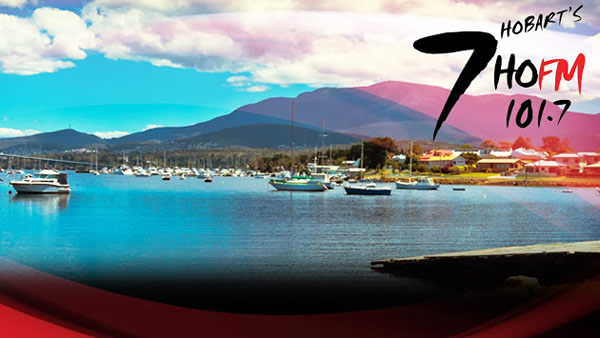
For decades no star was ever brighter than 7HO.
It was the dominant commercial radio station in Hobart. Led by Bob Cooke & Richard Moore’s breakfast show, the station’s revenue just kept pouring in. In those days, it was a licence to print money. However by 2003 the station was on the slide & it was sold to Grant Broadcasters.
So how did Grant Broadcasters’ Ross Turner engineer the station’s massive turnaround by beating Southern Cross Austereo’s Sea.FM & Heart.FM in the ratings conducted by Xtra Research late last year?
Ross is finally ready to spill the beans and we’ll talk to him in-depth later in this article.
First, however, we need to look back at the history of Hobart radio to discovery why the once mighty 7HO fell so heavily from grace.
I have a soft spot for radio in Hobart. I grew up there listening to 7HO, 7HT & the ABC’s 7ZR (now 936 ABC). I also had the pleasure of working at both 7HO & 7HT. I was consultant to TTT.FM when it launched in July 1990.
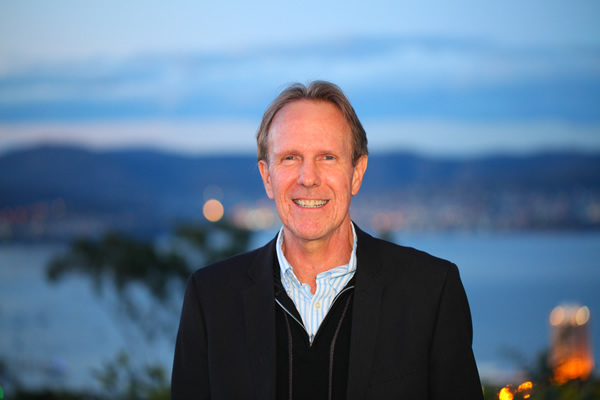
‘For over 50 years Hobart had two commercial radio stations, 7HO and 7HT. In 1987 it was a choice of Del Shannon or horse racing. 7HO had missed the 70s and 80s and were still stuck in the 50s and 60s. Mainland Australia had enjoyed commercial FM since the beginning of the 80s.
In 1988 a sample of 7HO’s playlist consisted of the following.
“Born Free” by Matt Monroe
“Swiss Maid” by Del Shannon
“Lucky Lips” by Cliff Richard
“Lipstick on Your Collar” by Connie Francis
“You Light up My Life” by Debbie Boone
& “Till the Twelfth of Never” by Johnny Mathis.
I could go on but you get the picture. Something had to change!
In 1988, three companies submitted applications to the Australian Broadcasting Tribunal (ABT) to become the first commercial FM licence holder in Hobart. 7HT and 7HO submitted that they should be granted an FM licence each and that there should be no new player in the market. This was based partly on economic grounds and partly on the need to have more diversity in radio programming in Hobart. All three new applicants along with the two incumbents conducted research into the perceptions and needs of the Hobart audience. All the research (five reputable research companies) indicated that there was a need to have a new station in Hobart targeting the under 35 age market. Furthermore, the research showed that this age group in the main wanted Rock music. Clearly this was not happening. Added to this 7HO was completely devoid of any station promotions or giveaways. They didn’t have to, they were effectively a monopoly.
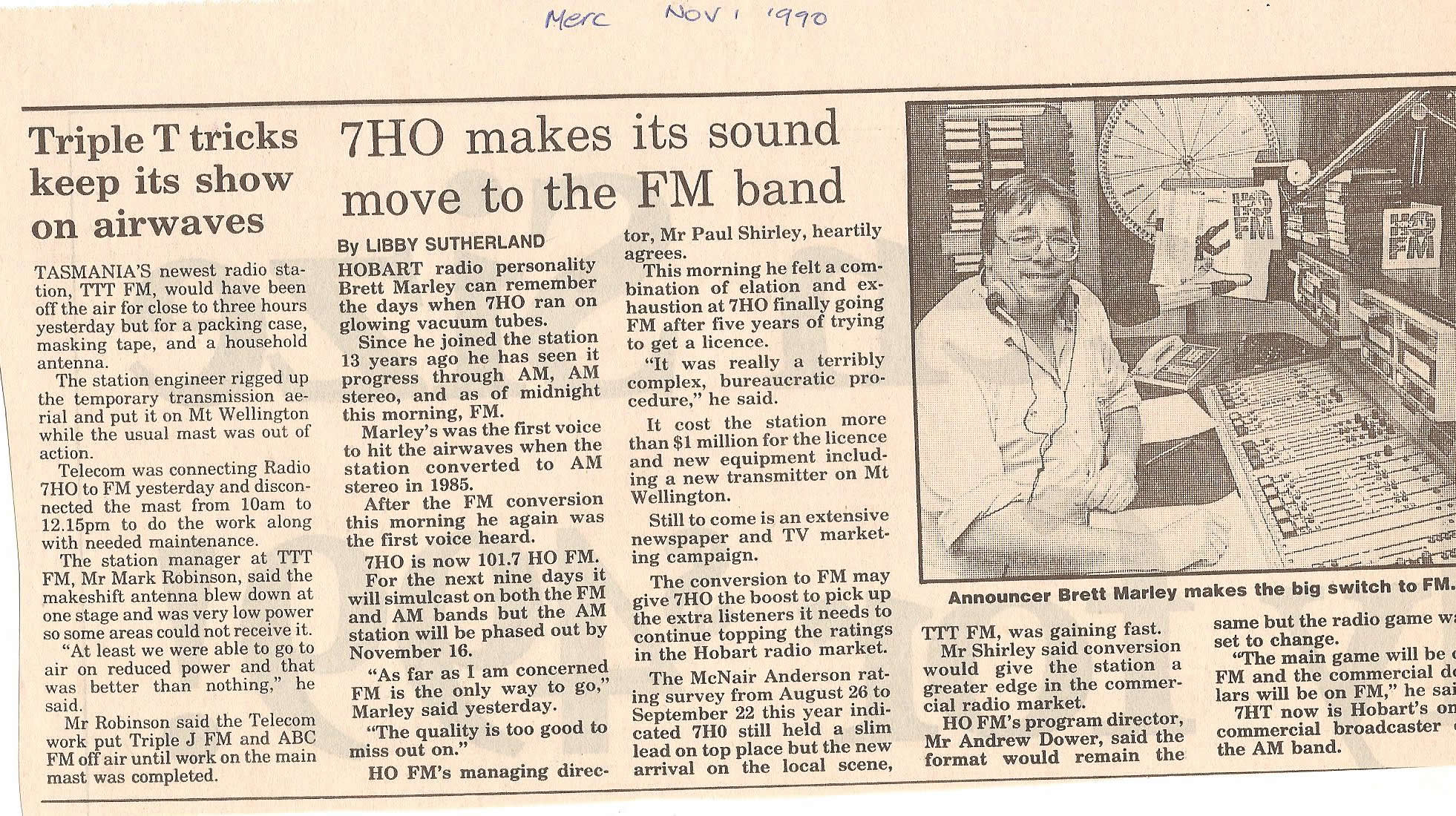
During the application phase the ABT gave clues as to what the revenue in the market was. Up till then, because there were only two commercial stations, they did not swap revenue figures. The ABT gave all the applicants a formula, which, when worked backwards, indicated the revenue in the market was $5.1m. This figure meant the one off application fee paid by the winning applicant was $877k. In the first year TTT budgeted for 26% of the market revenue.
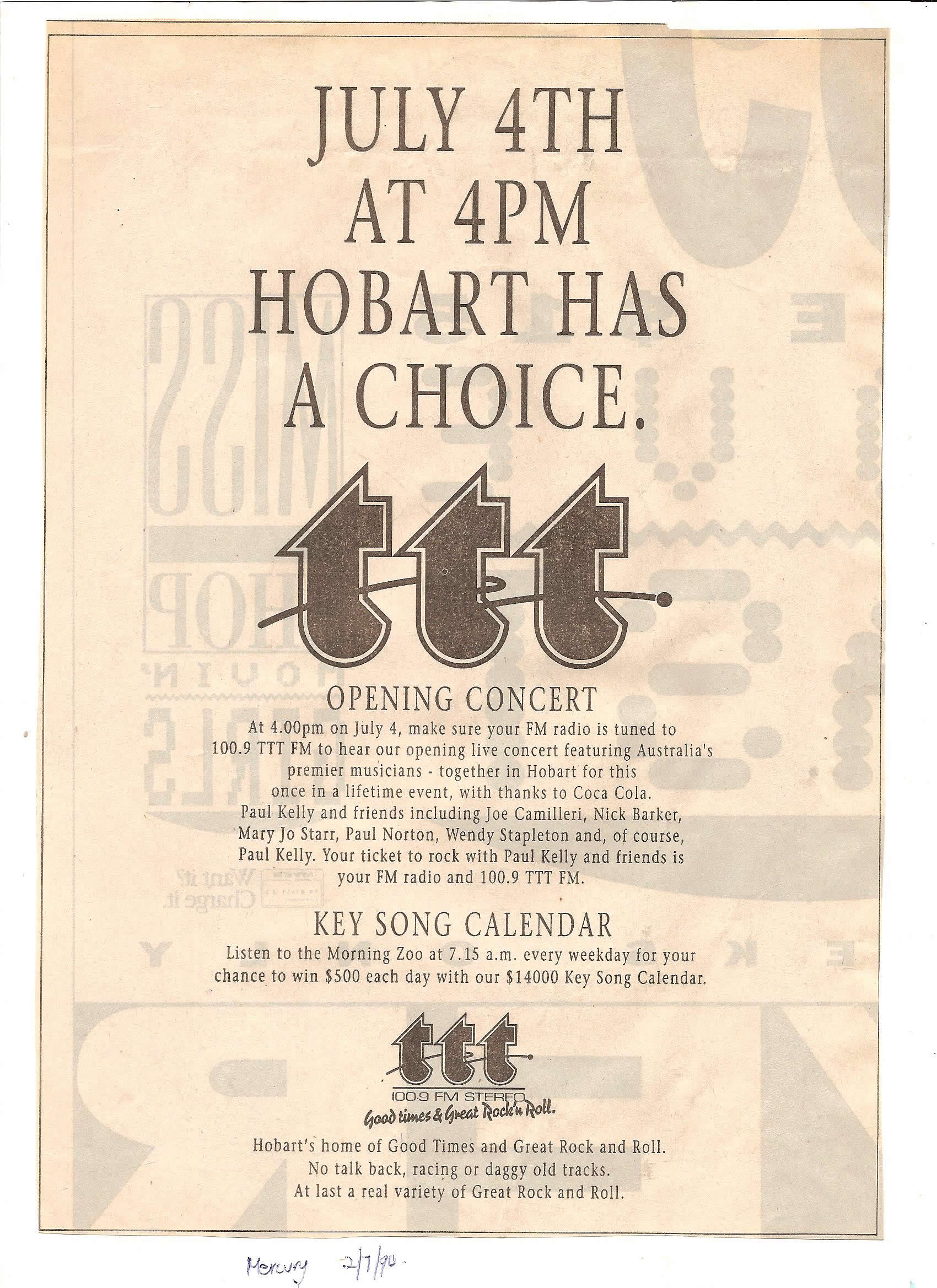 TTT went to air on the 4thof July 1990. On October the 4th 1990, The Hobart Mercury ran the headline “Hobart Radio Ratings Shock.” After 11 weeks TTT had an 18-24 share of 57.9%, a 25-39 share of 43.4% and were 2ndoverall to 7HO 28.9% to 31.9%. Cooke and Moore, 7HO’s breakfast team were still number one but had lost a third of their audience. Revenue figures were submitted to an independent accountant firm and instead of a predicted share of 26% the figure was just over 40%, a figure budgeted for in the 5thyear of operation. A few more months down the track something else started to become obvious. Instead of a total market figure of $5.1m the real figure was closer to $3.8m. By this time, the station was experiencing severe cash flow problems, and in fact, had had to make substantial cuts to the staff.
TTT went to air on the 4thof July 1990. On October the 4th 1990, The Hobart Mercury ran the headline “Hobart Radio Ratings Shock.” After 11 weeks TTT had an 18-24 share of 57.9%, a 25-39 share of 43.4% and were 2ndoverall to 7HO 28.9% to 31.9%. Cooke and Moore, 7HO’s breakfast team were still number one but had lost a third of their audience. Revenue figures were submitted to an independent accountant firm and instead of a predicted share of 26% the figure was just over 40%, a figure budgeted for in the 5thyear of operation. A few more months down the track something else started to become obvious. Instead of a total market figure of $5.1m the real figure was closer to $3.8m. By this time, the station was experiencing severe cash flow problems, and in fact, had had to make substantial cuts to the staff.
In May 1991 the Government admitted they had been in error with their revenue formula and admitted the revenue figure should have been $3.8m and as the revenue figure dictated the application fee the station was refunded $150k of the $877k. By then it was too late. TTT had paid a fortune to be located in the middle of the city, had ordered top of the line equipment and started off with a staff more in line with an FM station in a mainland capital city. They had run enormous promotions in the first year such as the $50,000 Bunch of Fives and a Skyshow sponsored for close to $100,000 in cash and contra. Nothing like this has been seen since in the Hobart market.
To make matters worse the Government went back on its word and after furious lobbying from 7HO; on the 16thof November 1990 HO FM went to air.
By April 1992 a 2ndsurvey had been conducted and TTT not only were number one 18-24 and 25-39 but number one 10+. Competition was fierce in those first couple of years. Whatever TTT did HO FM would directly copy. The Bunch of Fives (with much less money), The Classic Nine at Nine, Rocktober and The 100 days of Summer (HO FM The 101 Days of Summer reflecting their dial position). When I accused them of copying us, Paul Shirley, their GM shot back that we were Radio K-Mart on account of us using Austereo programming. I said if that is the case – they’re shoplifting!
In all my time at TTT, up till 2000 from memory we never won Breakfast.
In fact for most of the decade the ABC were number one 10+ and HO. FM’s team of Cooke and Moore dominated breakfast. As one of our Program Directors used to say, they were like a “pair of comfy slippers.” Breakfast is always the last shift to fall and in our case it never did. Heritage is a powerful thing.
Throughout the entire 90s decade all commercial stations suffered financially.
Hobart is a city of only 200,000 people and three independently owned radio stations in retrospect were always going to suffer. By the end of the millennium most of small town standalone stations across Australia were gobbled up by two or three national networks.
TTT turned Hobart radio upside down. In the first 10 years dozens of radio professionals passed through the doors. These people are now leading lights in Australian radio. Former staff who I run into say they cherish the time they spent at TTT. While we struggled financially, we created great radio with a group of people that felt part of a family that prided themselves in professional exciting radio that Hobartians still reminisce about today.
We sold TTT to RG Capital in June 2000… I remember saying to Rhys Holleran ‘make sure you don’t change the name’. I think it remained TTT for about 3 years before they changed it to SEA.FM’.
John Bender can be contacted at [email protected]
When you examine radio in Hobart you have to acknowledge the incredible success of 936 ABC, formerly 7ZR. The station is outright number 10+ by a big margin.
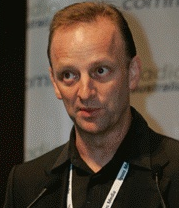 I asked Jeremy Millar, the Manager of Metropolitan Local Radio for ABC, the reason why 936 ABC is so successful.
I asked Jeremy Millar, the Manager of Metropolitan Local Radio for ABC, the reason why 936 ABC is so successful.
‘No other station comes close to 936 ABC Hobart for popularity. Nearly a quarter of the community have their dial set to ABC Local Radio in Southern Tasmania.
The creativity and energy of 936’s line-up is a hit with the audience with strong engagement across ages and demographics – it’s a tribute to the passion, hard work and commitment of the team’.
Back in October last year, the headlines cried:-
936 ABC Hobart has won Tasmania’s first ratings survey since November 2002 with 24.1 per cent of the market share.
The station was number one in the Breakfast, Mornings, Weekend and Evenings timeslots. Helen Shield’s Evening program reigned supreme with a massive 40.3 per cent of listeners.
Breakfast, presented by Ryk Goddard, was the number one program in its timeslot with a 25.5 per cent share of listeners and Leon Compton won the Mornings timeslot with a 27.6 per cent share.
“A result like this is highly motivating and a great tribute to the passion, hard work and creativity of our content makers,” ABC Local Radio Manager, Jocelyn Nettlefold said. “You can rely on the talented 936 team to keep you entertained and informed.
“It is an important reminder of the special relationship and trust the ABC shares with the local community. We’d like to thank our audience – those who choose to listen, write, call and interact with us every day.”
Louise Saunders’ Drive program had 18.6 per cent of listeners and was only narrowly beaten by triple j who had a 19.1 per cent in the same timeslot.
Chris Wisbey and the Grandstand team were unbeaten with 25.2 per cent of listeners tuning into the 936 ABC Hobart weekend show.
The survey conducted by Xtra Research, under the supervision of Commercial Radio Australia, revealed the most listened to stations were;
- 936 ABC Hobart 24.1%
- 7HO 15.4%
- JJJ 14.0%
- SEA FM 13.5%
- HEART FM 11.9%
- ABC Radio National 6.8%
- ABC Classic FM 4.1%
- ABC News Radio 1.5%
In Part 2 of 7HO.FM Hobart – From Worst to First, Ross Turner lays out his blueprint for winning the ratings war.
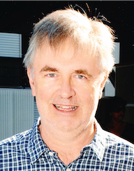
Greg Smith is an inductee into the Australian Radio Hall of Fame, and a Director of Radio Today.
